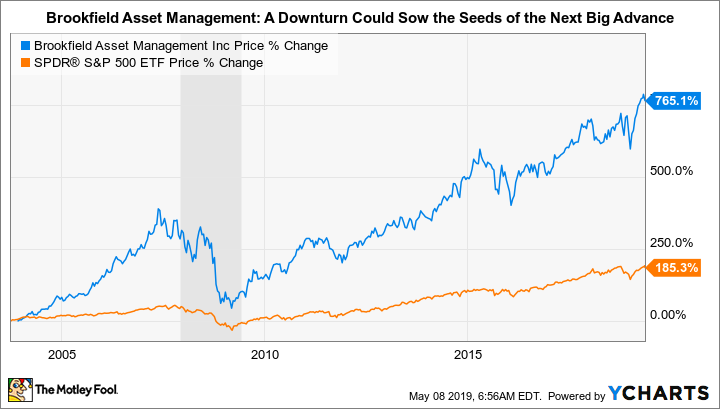Where Will Brookfield Asset Management Be in 10 Years?
Canadian-based Brookfield Asset Management (NYSE: BAM) isn't exactly a household name in the United States. But despite a lack of name recognition, it's still a powerhouse in the finance industry. It knows its niche, and the next 10 years will see it continue to execute the simple plan that's led to massive growth over the last decade. Here's what is likely to happen at Brookfield Asset Management in the years ahead.
The background story
Brookfield Asset Management's history goes back over 100 years to an investment in transportation and electricity in Brazil. Investing in infrastructure has remained the primary focus for the company, which for much of its existence managed its own money and serviced only large investors. However, it has increasingly reached out to smaller investors with an innovative lineup of investment options.

Image source: Getty Images
From a big-picture perspective, Brookfield has been launching limited partnerships that focus in on key niches in the infrastructure space. The company invests in these partnerships to help get them up and running and acts as the general partner, effectively running the show (and collecting fees for doing so).
The list of limited partnerships Brookfield controls today is fairly long. There's Brookfield Infrastructure Partners (NYSE: BIP), which owns a diversified collection of global infrastructure assets in industries as far flung as transportation, utilities, and, increasingly, data storage. It also controls Brookfield Renewable Partners (NYSE: BEP), which as the name implies is focused on renewable energy. Brookfield Property Partners (NASDAQ: BPY) owns real estate, largely competing with real estate investment trusts. And Brookfield Business Partners (NYSE: BBU) buys infrastructure-related business, much like a private equity company might.
Using public vehicles like these has helped Brookfield Asset Management to materially increase the assets it manages. In 2009 the company's assets under management totaled around $108 billion. By the end of 2018 it had $355 billion in assets under management. Assets under management is a vital figure to watch at any asset management firm because increasing assets leads to increasing fee revenues. Clearly the Canadian company has been doing something right.
Downturns won't hamper the long-term story
What's interesting about this time period, however, is that it is all bull -- as in bull market. The last recession ended in 2009, and since that point the stock market has been heading steadily higher. So Brookfield Asset Management has had the wind at its back for a very long time. The next decade isn't likely to be as kind, with a downturn of some sort highly likely. (Like it or not, bears inevitably follow bulls -- and vice versa.) When a downturn eventually hits, it will likely take a material toll on Brookfield Asset Management's assets under management.
There's two reasons for this. First, a good portion of those assets are tied up in publicly traded partnerships that will likely see their unit prices decline, thus leading to lower fees from these entities. Second, investors are usually less inclined to put money into the stock market when it's skidding. In fact, some investors are likely to actively remove money from the market. These facts are not a commentary on Brookfield Asset Management's ability, but simply a fact of life in the field of investing.
What's interesting about the approach here, however, is that the limited partnerships Brookfield Asset Management controls will continue operating the assets they own. The value of these partnerships will wax and wane with the market, but the physical assets will remain -- and so will their earnings power. Brookfield Asset Management likes to call this permanent capital.
In fact, a downturn could actually be an opportunity for the Brookfield family, since it generally likes to buy assets on the cheap. If it continues that long-term trend during the next downturn, it will come out a larger and stronger entity when the markets start to recover.
That's vastly different from the situation at asset management firms that provide their services to the public through mutual funds and exchange-traded funds, in addition to direct management accounts for high-net-worth individuals. Assets can quickly, and sometimes permanently, be removed in this more traditional asset management business model. That gives Brookfield Asset Management a leg up on the competition when it comes to growing its business over time.
It's also noteworthy that Brookfield Asset Management recently bought a controlling 62% stake in famed asset manager Oaktree Capital Group. This company, which focuses on the debt markets, made headlines during the deep 2007 to 2009 recession by investing heavily during the downturn. It reaped the financial rewards of that move (and media acclaim) when the fear of a global market collapse proved overzealous.
For Brookfield Asset Management, this acquisition expanded its offerings into a new space and provided it with a deeper bench of knowledgeable investment professionals. Although it's hard to expect Oaktree to replicate its previous success when the next downturn hits, the knowledge that its asset team has gained from that downturn should help Brookfield Asset Management better navigate the next bear market.
So it looks like Brookfield Asset Management is well prepared for the next downturn -- which means that, over the long term, the asset manager's assets under management are likely to continue growing. And the more assets it oversees, the more opportunity it has to grow earnings.
Should be a generally good ride
Nobody knows what will happen over the next decade, so it is impossible to say exactly what will happen at Brookfield Asset Management. However, what is very clear is that the giant Canadian asset manager has created a strong business model that should be able to continue growing over time.
It will be buffeted by the next downturn when it comes, of course. But because of the company's use of controlled limited partnerships, it's highly likely that such a downturn will be used to invest for the long-term benefit of the company, its controlled partnerships, and investors. In other words, if the market is doing well Brookfield Asset Management will keep winning. And if the market falls, Brookfield Asset Management will likely keep winning. Essentially, there will be ups and downs, but continued growth looks highly likely over the next 10 years at this well-positioned asset manager
More From The Motley Fool
Reuben Gregg Brewer has no position in any of the stocks mentioned. The Motley Fool owns shares of and recommends Brookfield Asset Management and Oaktree Capital Group. The Motley Fool recommends Brookfield Infrastructure Partners. The Motley Fool has a disclosure policy.

 Yahoo Finance
Yahoo Finance 
